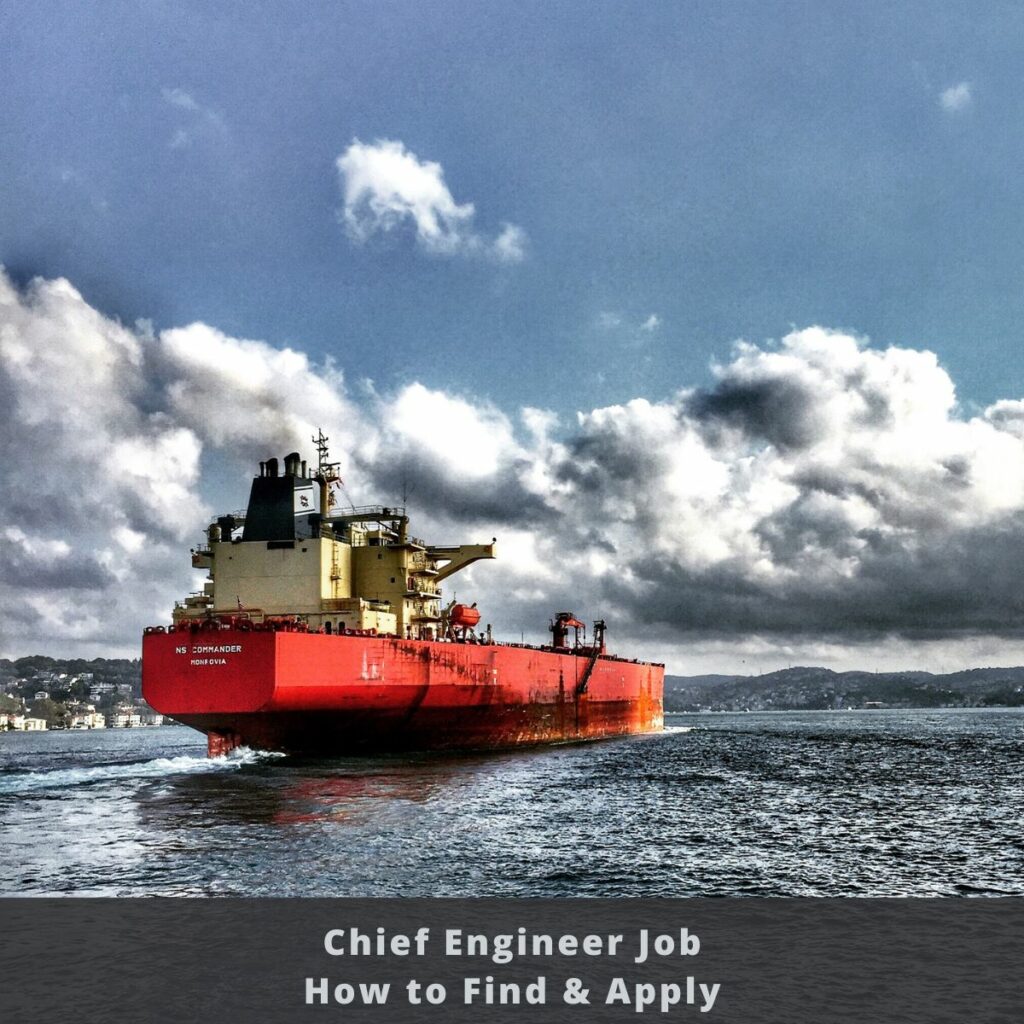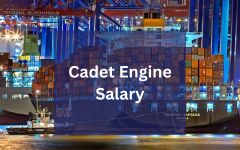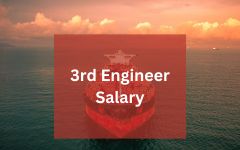Chief Engineer Job
The maritime industry is an important sector that is responsible for moving goods and people across the seas. In order to ensure that these operations are carried out effectively, the industry requires experienced professionals who can handle the technical aspects of the industry. One such professional is the Chief Engineer, who is responsible for overseeing the operations and maintenance of a vessel's mechanical and electrical systems. In this article, we will discuss how to find and apply for a Chief Engineer job in the maritime industry.
Brief Overview - Chief Engineer in the Maritime Industry
The role of a Chief Engineer in the maritime industry is crucial to ensuring the safety and efficient operation of a vessel. They are responsible for managing and supervising the vessel's engine department, which includes the maintenance and repair of mechanical and electrical systems.
The Chief Engineer is also responsible for ensuring that all safety and environmental regulations are met. They work closely with the Captain and other members of the senior management team to ensure that the vessel is operated in accordance with international maritime regulations.

In addition to overseeing the engine department, the Chief Engineer is also responsible for managing the vessel's crew, which includes training them to handle emergencies and ensuring they follow safety procedures. The Chief Engineer must have excellent communication and leadership skills to effectively manage a team of individuals in a high-pressure environment.
Furthermore, the Chief Engineer plays an important role in ensuring that the vessel operates efficiently. They are responsible for monitoring fuel consumption, optimizing engine performance, and ensuring that the vessel meets its scheduled arrival times.
A Chief Engineer must have a strong technical background in marine engineering, with experience in the maintenance and repair of various types of mechanical and electrical systems. They must also have excellent problem-solving skills, as they will be required to troubleshoot complex technical issues that may arise.
In addition to technical skills, a Chief Engineer must have a deep understanding of industry regulations, including the International Maritime Organization (IMO) regulations. They must be able to ensure that the vessel is operating in compliance with these regulations to avoid any legal issues that may arise.
Ensuring Safe & Efficient Operations of a Vessel
The role of a Chief Engineer in the maritime industry is of utmost importance in ensuring the safe and efficient operation of a vessel. A Chief Engineer is responsible for the management of the vessel's engine department and all technical aspects of the vessel. They play a vital role in ensuring that the vessel operates smoothly, minimizing downtime, reducing fuel consumption, and avoiding potential accidents or environmental hazards.
Safety is the highest priority in the maritime industry. A Chief Engineer must be highly skilled and experienced to ensure that the vessel's machinery and systems are maintained and operated in a safe manner. They must have the knowledge and experience to manage the vessel's technical operations, oversee the engine department, and ensure the safe and efficient operation of the vessel.
Efficiency is another critical aspect of a Chief Engineer's role. They are responsible for optimizing engine performance, fuel consumption, and other technical aspects of the vessel. By doing so, they ensure that the vessel meets its scheduled arrival times and operates efficiently, reducing downtime and saving money for the company.
A Chief Engineer's role is also crucial in ensuring compliance with international maritime regulations. They must ensure that the vessel is operated in accordance with international maritime laws, regulations, and safety standards. They must be knowledgeable about these regulations and ensure that the vessel is compliant, avoiding any legal or regulatory issues that may arise.
The Chief Engineer plays a critical role in leading and managing the vessel's engine department. They are responsible for ensuring that the department is properly staffed and trained, ensuring that the team follows safety procedures, and managing the day-to-day operations of the department. The Chief Engineer must have excellent leadership and communication skills to effectively manage the team in a high-pressure environment.
Qualifications for a Chief Engineer Job
To become a Chief Engineer in the maritime industry, individuals must meet certain qualifications. These qualifications are essential in ensuring that the Chief Engineer is capable of managing the vessel's engine department, overseeing the technical aspects of the vessel, and ensuring the safety and efficiency of its operation.
The first qualification required for a Chief Engineer job in the maritime industry is education. Most Chief Engineers have a bachelor's degree in marine engineering or a related field. This degree provides the foundation for the technical knowledge required for the job. Additionally, some companies may require a Master's degree in marine engineering or a related field, particularly for more senior positions.
Experience in the industry is also a critical qualification for a Chief Engineer job. Most companies require candidates to have at least five to ten years of experience working in the maritime industry. This experience provides the candidate with the knowledge and expertise necessary to manage the vessel's engine department and technical operations.
A Chief Engineer license is also required to work in this position. The license is issued by the Maritime and Coastguard Agency (MCA) and is a mandatory requirement for all Chief Engineers. The license requires the individual to meet certain educational and experience criteria and pass a series of written and practical exams to demonstrate their competency.
Familiarity with industry regulations is another crucial qualification for a Chief Engineer job. They must have a deep understanding of international maritime regulations, such as the International Maritime Organization (IMO) regulations. This understanding is essential to ensure that the vessel is operated in compliance with these regulations, avoiding any legal issues that may arise.
In addition to these qualifications, a Chief Engineer must have certain skills and attributes to be successful in the role. They must have excellent problem-solving skills, as they will be required to troubleshoot complex technical issues that may arise. They must also have strong communication and leadership skills to manage the engine department and communicate effectively with the rest of the senior management team.
Where to Find Chief Engineer Jobs in the Maritime Industry
Finding Chief Engineer jobs in the maritime industry can be a challenging task. The maritime industry is highly competitive, and Chief Engineer positions are highly sought after by professionals in the industry. However, there are several ways to find Chief Engineer jobs in the maritime industry.
One of the most common ways to find Chief Engineer jobs in the maritime industry is to search job websites. Websites such as Vesseljoin, LinkedIn, Indeed, and Monster list job openings in the maritime industry, including Chief Engineer positions. These websites allow individuals to search for jobs based on location, job title, and other criteria. Additionally, job seekers can create profiles on these websites, making it easier for employers to find them.
Networking is another effective way to find Chief Engineer jobs in the maritime industry. Attending industry events, joining professional organizations, and connecting with industry professionals on social media platforms such as Vesseljoin can help job seekers make connections that may lead to job opportunities. Networking can also provide job seekers with valuable insights into the industry and the job market. What are you waiting for? The easiest way to find seafarers, send them friend requests, exchange messages, create your online profile, and connect with shipping companies is Vesseljoin. The first professional social media platform only for the maritime industry!
Working with a recruitment or crewing or manning agency can also be an effective way to find Chief Engineer jobs in the maritime industry. Recruitment agencies specialize in connecting job seekers with employers, often providing job seekers with access to job opportunities that may not be advertised elsewhere. Recruitment agencies also provide job seekers with valuable insights into the industry and can help them prepare for interviews and negotiate job offers.
Another way to find Chief Engineer jobs in the maritime industry is to search company websites directly. Many companies in the maritime industry list job openings on their websites, including Chief Engineer positions. This approach can be especially effective for individuals who have a particular company in mind that they would like to work for.
Finally, individuals who are interested in Chief Engineer jobs in the maritime industry can explore opportunities for sea jobs. These jobs are typically related to the operation of vessels and can include positions such as deck officer, marine engineer, and other related positions. By exploring opportunities for sea jobs, individuals can gain valuable experience in the industry, which can be helpful in securing a Chief Engineer position in the future.
How to Apply for Chief Engineer Jobs in the Maritime Industry
Applying for Chief Engineer jobs in the maritime industry requires a strategic approach to increase the chances of success. Here are some steps to follow when applying for Chief Engineer jobs in the maritime industry:
- Review the job requirements and qualifications: Before applying for a Chief Engineer job, it's essential to review the job requirements and qualifications. Ensure that you meet the minimum requirements for the position, including educational qualifications, experience, and certifications. This will help to avoid wasting time and energy applying for jobs that you are not qualified for.
- Update your resume and cover letter: Your resume and cover letter are critical components of your job application. Ensure that your resume highlights your qualifications and relevant experience for the Chief Engineer job. Your cover letter should be tailored to the specific job you are applying for, highlighting why you are the best fit for the position.
- Apply for the job: Once you have reviewed the job requirements and updated your resume and cover letter, it's time to apply for the job. Some companies in the maritime industry may require you to apply online, while others may require you to send your application materials by email or mail. Ensure that you follow the company's application instructions and submit your application materials by the deadline.
- Prepare for the interview: If your application is successful, you may be invited for an interview. Preparing for the interview is crucial to increase the chances of success. Research the company and the Chief Engineer job, and prepare answers to common interview questions. Additionally, ensure that you have appropriate attire for the interview.
- Negotiate the job offer: If you are successful in the interview, you may receive a job offer. Negotiating the job offer is essential to ensure that you receive fair compensation and benefits. Research the average salary and benefits for Chief Engineer jobs in the maritime industry to ensure that you receive a competitive offer.
For individuals exploring opportunities for sea jobs, the application process may differ slightly. Sea jobs typically require individuals to have relevant certifications and licenses, and many positions may require individuals to have prior sea experience. To apply for sea jobs, individuals can search for openings on job websites, company websites, or work with manning agencies specializing in sea jobs. The application process may require individuals to submit their resume and cover letter, as well as relevant certifications and licenses. Additionally, some sea jobs may require individuals to complete a medical examination and undergo drug testing.
Advise for Chief Engineers
Chief Engineers play a critical role in the maritime industry, ensuring the safe and efficient operations of vessels. As such, it's essential for Chief Engineers to succeed in their roles. Here are some pieces of advice for Chief Engineers on how to succeed in the maritime industry:
- Continuously update your knowledge and skills: The maritime industry is constantly evolving, with new technologies and regulations emerging. It's crucial for Chief Engineers to stay up-to-date with the latest developments in their field. Continuously updating your knowledge and skills through training courses, workshops, and seminars can help you stay relevant and valuable to your employer.
- Build strong relationships with the crew: As a Chief Engineer, you work closely with the crew to ensure that the vessel is operating safely and efficiently. Building strong relationships with the crew can help you communicate effectively and address any issues that may arise. It's essential to treat the crew with respect and be approachable, fostering a positive work environment.
- Embrace new technologies: New technologies are transforming the maritime industry, making it more efficient and safer. As a Chief Engineer, it's essential to embrace new technologies and incorporate them into your work. Familiarizing yourself with new technologies and understanding how they can improve vessel operations can help you stay ahead of the competition.
- Stay organized and manage your time effectively: The role of Chief Engineer in the maritime industry is demanding, requiring attention to detail and the ability to multitask. Staying organized and managing your time effectively can help you stay on top of your responsibilities. Develop a system that works for you, whether it's using a task management app or maintaining a detailed calendar.
- Maintain a safety-first mindset: Safety is the top priority in the maritime industry. As a Chief Engineer, it's crucial to maintain a safety-first mindset, ensuring that all operations on the vessel are carried out safely. Conduct regular safety audits, provide safety training to the crew, and ensure that all safety equipment is in good working condition.
- Network with other industry professionals: Networking with other industry professionals can help you stay up-to-date with the latest developments in the maritime industry. Attend industry conferences, join professional organizations, and connect with other Chief Engineers on social media. Building a network of industry contacts can help you find new job opportunities and stay informed about the latest industry trends.
- Take care of your physical and mental health: The role of Chief Engineer in the maritime industry can be physically and mentally demanding. Taking care of your physical and mental health is essential to succeed in this field. Eat a balanced diet, exercise regularly, and get enough sleep. Additionally, seek support from friends, family, or a mental health professional if you're struggling with stress or burnout.
Sign up and use Vesseljoin today in order to: network, find sea jobs, apply easily, create your online profile or CV, and connect with maritime companies. Everything you need in one platform!






